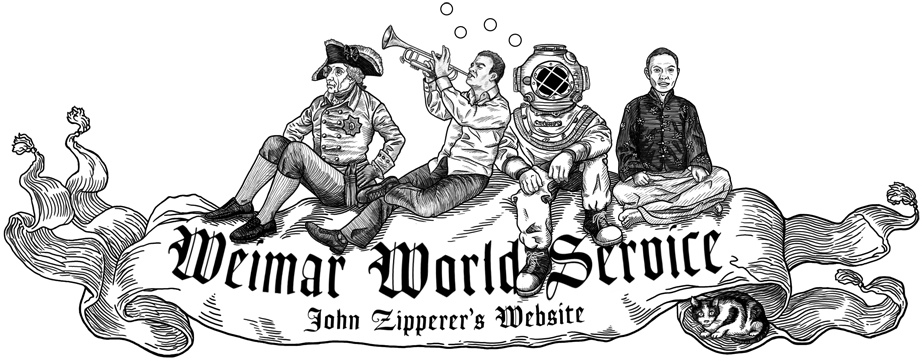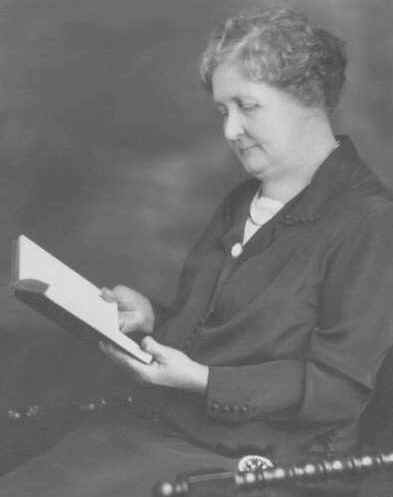 |
| Words |

Above: My great grandmother (my father's maternal grandmother),
demonstrates that books have long been an important part of
my family.
A writer once complained about
modern people's inability to separate the sublime and the profane,
and this list mixes up the two rather well. On this page, I present a varied list – well, a slew – of books I've read in recent years, many of them recommended.
Copyright
© 20109 John Zipperer
"The
truth doesn't change according to our ability to stomach it."
—Flannery
O'Connor
"There is nothing worse than aggressive stupidity."
–Johann Wolfgang von Goethe
"The
content of your mind — your values and ideas — are nobody's
business but your own."
—Kerry O'Quinn
"From
what source can we derive those standards of right and wrong strong
enough to challenge, if need be, the very system we have been brought
up to accept as right, and to counter the deep normative power of
the given? Where to find the courage to defend these values 'unflinchingly,'
even to the death, if we know all along that they are only relative?
And how to impart not just the values but also the courage to our
children?"
—Timothy Garton Ash
The File
"So learn from this
/ and understand true values. I who tell you / have wintered into
wisdom."
—Hrothgar, Beowulf (Seamus Heaney, translator)
"I
recognize nothing in this world as constantly immutable, nor any theory
as absolutely correct. All ideological theory is relative, for within
its existing context it contains elements of relative truth and, conversely,
elements of relative absurdity. At one given time and in one given
situation it may be a relatively accurate theory, whereas at another
given time and situation it can be relatively preposterous."
—Wei Jingsheng, from his defense statement before a Beijing
court, October 16, 1979, on trial for prodemocracy activities; quoted
in The Courage to Stand Alone: Letters from Prison and Other Writings
"Enlightenment
brought him the burden of morality, which in turn could only be borne
by enlightenment."
—Ray Huang on Hai Jui in 1587: A Year of No Significance
"The
spirit of our American radicalism is destructive and aimless: it is
not loving, it has no ulterior and divine ends; but is destructive
only out of hatred and selfishness. On the other side, the conservative
party, composed of the most moderate, able, and cultivated part of
the population, is timid, and merely defensive of property. It vindicates
no right, it aspires to no real good, it brands no crime, it proposes
no generous policy, it does not build, nor write, nor cherish the
arts, nor foster religion, nor establish schools, nor encourage science,
nor emancipate the slave, nor befriend the poor, or the Indian or
the immigrant. From neither party, when in power, has the world any
benefit to expect in science, art, or humanity, at all commensurate
with the resources of the nation." —Emerson, "Politics"
"Moribus
antiquis res stat Romana virisque" — "By its ancient way
of life and its men the Roman state stands firm" —Publius
Ovidius Naso
"Do
all the good you can,/By all the means you can,/In all the ways you
can,/ In all the places you can,/ At all the times you can,/ To all
the people you can/ As long as ever . . . you can!"
—John Wesley
"Be
kind, for everyone you meet is fighting a hard battle."
—Plato
|
|
| |

Noteworthy Recent Books |
Beerholm's Vorstellung, by Daniel Kehlmann: Young artist's story
Beowulf,
translated by Seamus Heaney
Berlin: A Century of Change, photo history of
Berlin in the 20th Century
The Brother of Sleep, by Robert Schneider: Novel about
a great musical talent wasted on Bavarian mountain rustics
The Burgermeister's Daughter, by Steven Ozment; true
tale of a woman's power struggle in the Middle Ages
Christopher and His Kind, by Christopher Isherwood:
Isherwood comes clean about the 30's—and fills in some
of the details about his homosexuality that had been omitted
from his previous writing on that time period
The Civilization of the Middle Ages, by Norman F. Cantor:
what made the medieval period what it was, and how the medieval
period made the West what it is
The Clash of Civilizations and the Remaking of World Order,
by Samuel P. Huntington: controversial but intriguing look at
post-Cold War international conflict and how to minimize it
The Colour of Magic, (and all subsequent wonderful
Discworld novels) by Terry Pratchett; fantastic humorous tales
The Conquest of Gaul, by Julius Caeser: He came,
he saw, he wrote propaganda to help him overthrow the republic
back home
Drachenreiter, by Cornelia Funke: great novel
about a boy and his dragon. And his kobold. And rats...
Dr. Eckener's Dream Machine, by Douglas Botting: the
Zeppelins and the dawn of air travel
Early Modern Germany, 1477-1806, by Michael Hughes: the
Holy Roman Empire in Germany until it was ended by Napoleon
Eduard's Homecoming, by Peter Schneider: German angst
won't leave us alone
Excession, by Ian M. Banks: A real science-fiction
novel, in a plot that makes real use of technological and social
advances
Faceless Killers (and the rest of the Kurt Wallander
novels), by Henning Mankell: Swedish mystery novels
The File: A Personal History, by Timothy Garton Ash:
An exploration of Stasi internal spying and its impact on individuals
and nations
Frederick the Great,
by Nancy Mitford: engaging biography of Prussia's greatest king
— who says homosexuals shouldn't serve in the military?
Der Fussballgott, by citizen_b: mystery
German Boy, by Wolfgang W. E. Samuel: Story of
German civilians fleeing Russians after WW II, then building
new life after the war
Germany in the High Middle Ages c. 1050-1200,
by Horst Fuhrmann
Gustav Stresemann: Weimar's Greatest Statesman, by Jonathan
Wright: the famed (and controversial) foreign minister for Germany's
ill-fated first republic
Harry Potter und die Kammer des Schreckens (German translation),
by Joanne K. Rowling: yes, as good as they say it is; also subsequently
have read all of the rest of the Potter books
Inkheart, by Cornelia Funke: Novel of fictional characters
who come to life; from one of my favorite authors
The Magicians, by Lev Grossman: It's been called a Harry Potter with swearing and sex, but it's more interesting than that
The Martian Child, by David Gerrold: I highly
recommend this novel, based on a true story
Measuring the World, by Daniel Kehlmann (Vermessung
der Welt, auf deutsch): Excellent novel about two Enlightmentment
figures
Narcissus and Goldmund, by Hermann Hesse: Battle between
the spirits of man
The New Conservatism, by Jurgen Habermas; awesome
work covering the German Historians' Debate of the 1980s, plus
the author's defense of Enlightenment thinking against post-structuralism
Parallel Worlds, Michio Kaku: String theory, multiverse,
and so much more explained by one of my favorite scientists
The Reader, by Bernhard Schlink: war and remembrance
The Red Prince, by Timothy Snyder: Makes you think that the Austro-Hungarian Hapsburg Empire maybe was worth preserving after all
The Remorseful Day, by Colin Dexter: The end of Inspector
Morse
Revolution, Resistance, and Reform in Village China,
by Edward Friedman, Paul Pickowicz, and Mark Selden: What Maoist
and post-Mao China were/are really like
The Secrets of the Chess Machine, by Robert Löhr: Absorbing fact-based novel about a man who fooled the best of Europe with his fake machine
The Thief Lord (English and the German edition
— Herr Der Diebe), by Cornelia Funke: wonderful
tale about orphans in Venice — and a treasure that will
change some of them forever; very highly recommended
The Thirty Years' War, by C.V. Wedgewood: Horrific tale,
expertly told
Two Planets, by Kurd Lasswitz: Classic German science fiction novel
Vagrant Viking, by Peter Freuchen: fascinating trip through
Greenland in the early decades of the 20th century
The Vanished Kingdom, by James Charles Roy: history of
Prussia
Will in the World, by Stephen Greenblatt: Shakespeare
biography
A Year at the Movies, by Kevin Murphy; he saw a movie
a day for an entire year, and yet he retains high standards! |
Other Worthy Books |
There
are some very worthy books I read before the timeframe covered
above that I would still like to bring to your attention; I've
left out the less worthy contenders: The
Adventures of Huckleberry Finn, by Mark Twain
The
Agricola and the Germania, by Tacitus: Roman biography
and history
The Assistant, by Bernard Malamud
A Berlin Republic: Writings on Germany, by Jurgen Habermas
The Berlin Stories, by Christopher Isherwood
Breaking the News, by James Fallows
The Centaur, by John Updike
The
Chain Gang: One Newspaper versus the Gannett Empire, by Richard
McCord: Excellent book about my hometown's former paper, the Green
Bay News-Chronicle, and its struggle against the Gannett-owned
competition; also, a worrying look at the American attitude toward
fair competition and honest
China Mountain Zhang, by Maureen F. McHugh
A Confederacy of Dunces, by John Kennedy Toole
The Courage to Stand Alone, by Wei Jingsheng
The Dark Beyond the Stars, by Frank M. Robinson
The Decline and Fall of the Roman Empire, Volumes
I-III, by Edward Gibbons
The Early History of Rome,
by Livy; ancient republican Rome
1587, A Year of No Significance, by Ray Huang
Funny Boy, by Shyam Selvadurai
The German Comedy, by Peter Schneider: essays on German
life after the Wall: excellent example of intelligent, independent
thinking
The Germans, by Gordon Craig
Germany 1866-1945, by Gordon A. Craig; Craig's the best
The Great Gatsby, by F. Scott Fitzgerald
The Packer Chronicles, by Lyle Lahey
A Prayer for Owen Meany, by John Irving
Raise the Red Lantern (and other stories), by Su Tong
The Rape of Nanking, by Iris Chang
Revolutionary France 1770-1880, by Francois Furet
The Rise and Fall of Weimar Democracy, by Hans Mommsen
The Rise of Christianity, by Rodney Stark
Rome and Italy, by Livy
Rome and the Mediterranean, by Livy
Sex Between Men, by Douglas Sadownik
The Temple, by Stephen Spender
A Terrible Revenge, by Alfred-Maurice de Zayas: subtitled
"the ethnic cleansing of the East European Germans, 1944-1950"
The Thanatos Syndrome, by Walker Percy
Vagabonding Through Changing Germany, by
Harry A. Frank, travelogue written in 1920; fascinating insight
into post-WWI German lives
Virtually Normal, by Andrew Sullivan
The War with Hannibal, by Livy
|
|


